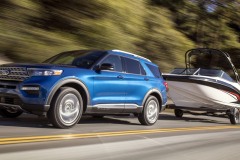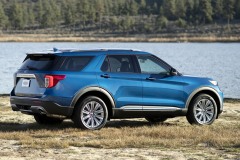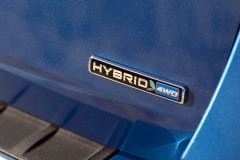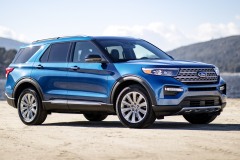Just a Little Bit Greener
The legendary Ford Explorer is a vehicle that can be either celebrated or blamed for the rise of the SUV, depending on your point of view. The first generation appeared in 1990 as a 1991 model, popularizing the tall, truck-platform-based family hauler that is now ubiquitous on American roads. Although today’s “crossover” versions of the sport utility vehicle, including the Explorer, are based on unibody car platforms, they still sit tall, haul a lot of people and stuff, and sell in large numbers.

If you want to have all of the sport and utility of an SUV and still give a nod to its environmental impact, you can opt for the new, sixth-generation Ford Explorer in its Hybrid form. As part of the widest range of offerings in the model’s three-decade history, the Hybrid combines an electric motor with a traditional 3.3-liter V6, which increases fuel economy and provides the greatest range of any Explorer you can buy.
New for 2020
2020 marks a major redesign, so while the overall proportions look like an Explorer—and its many competitors—there’s much to like from an aesthetic point of view. The sides are attractively sculpted, the face is fresh, and the interior feels up to date. The textured pseudo wood trim in my Atlas Blue tester looked obviously fake, but during the trip I took to visit my grandkids over the holidays, the Explorer delivered the smooth ride, spacious accommodations and high-tech interface buyers crave. The B&O 12-speaker sound system was a joy. The fat, leather-wrapped steering wheel was a very pleasant place to touch.

The 10-speed automatic transmission shifts often to keep in the heart of the power band and works through a stylish dial on the center console–an upscale touch.
The driving experience is likely very similar between models, while the emission differences between the Hybrid and the other models are incremental. Looking at EPA fuel economy, for example, the base four-cylinder-equipped model, with rear-wheel drive, gets 21 mpg city/28 highway/24 combined. The powerful 3.0-liter EcoBoost V6-powered model, likely the big seller, gets 18 mpg city/24 highway/20 combined. The Hybrid bests them a bit, with 27 mpg city/29 highway/28 combined (23/26/25 for the AWD model). During my test week, I averaged a disappointing 23.1 mpg, below the EPA official figures, but it would possibly move upwards over a longer period.
Twenty-eight miles per gallon is a little above the average of all cars sold today, but still doesn’t approach the 50+ mpg Prius territory or the higher mpg equivalents of EVs. However, it does represent a 40 percent improvement over the thirstiest version, and the driving experience still delivers the robust power and performance SUV drivers demand.
The Numbers
The Hybrid tips the scales a little above the others, at 4,969 pounds versus the base vehicle at 4,345 and the V6 at 4,727. That’s presumably because of adding the electric motor and battery. Two-and-a-half tons is pretty massive no matter which way you slice it.

Range wise, per EPA tests, the Hybrid wins, with 540 miles vs. 461 for the base vehicle and 436 for the popular V6. And with higher mpg, annual fuel costs will be less. Fueleconomy.gov stats show the hybrid costing owners $250 a year below average while the four-cylinder will cost $750 above average and the V6 $2,500 above average.
As with any vehicle with a range of models and options, pricing varies. My tester, with optional 20-inch polished aluminum wheels and a twin-panel moonroof, came to $55,665 with destination and delivery charges. Explorers start at $37,770 for the base XLT and head northward to $59,639 for the Platinum top-level offering.
Considering environmental impact, there are no truly “green” cars with Explorer nameplates on them, but the Hybrid provides a difference, although it’s not monumental. In barrels of oil consumed per year, the Hybrid uses 11.8 versus 13.7 for the four-cylinder and 16.5 for the V6. While all three models earn a middling 5 in the EPA Smog rating, the Hybrid collects a 6 for Greenhouse Gas against 5 for the four-cylinder model and 4 for the V6.

The real point, then, is that the Ford Explorer Hybrid provides some improvement, but is still burning a lot of gas every time it hits the road. It puts out 322 parts per million (ppm) of CO2 every mile, against 370 ppm for the four-cylinder and 446 ppm for the big V6. Incremental.
If you truly need a big hauler like this, the Explorer will surely provide a worthy solution. But if you don’t, there are other options. I expect to see a plug-in hybrid and maybe even an all-electric Explorer sometime this decade, perhaps with the promising drivetrain from the upcoming Mustang EV. Stay tuned.
Make sure to opt-in to the Clean Fleet Report newsletter (top right of page) to be notified of all new stories and vehicle reviews.
Whatever you end up buying, Happy Driving!
Related Stories You Might Enjoy—The Big SUV Options
Road Test: 2019 Jeep Grand Cherokee
Road Test: 2018 Toyota Highlander Hybrid
Road Test: 2020 Kia Telluride
Road Test: 2019 Buick Enclave
Road Test: 2019 Mazda CX-9
Road Test: 2019 Subaru Ascent
Comparison Test: 2018 Volkswagen Atlas V6 vs. 4
Event: Three-Row SUV Comparison
Disclosure:
Clean Fleet Report is loaned free test vehicles from automakers to evaluate, typically for a week at a time. Our road tests are based on this one-week drive of a new vehicle. Because of this we don’t address issues such as long-term reliability or total cost of ownership. In addition, we are often invited to manufacturer events highlighting new vehicles or technology. As part of these events we may be offered free transportation, lodging or meals. We do our best to present our unvarnished evaluations of vehicles and news irrespective of these inducements.
Our focus is on vehicles that offer the best fuel economy in their class, which leads us to emphasize electric cars, plug-in hybrids, hybrids and diesels. We also feature those efficient gas-powered vehicles that are among the top mpg vehicles in their class. In addition, we aim to offer reviews and news on advanced technology and the alternative fuel vehicle market. We welcome any feedback from vehicle owners and are dedicated to providing a forum for alternative viewpoints. Please let us know your views at publisher@cleanfleetreport.com.






15 thoughts on “Road Test: 2020 Ford Explorer Hybrid”